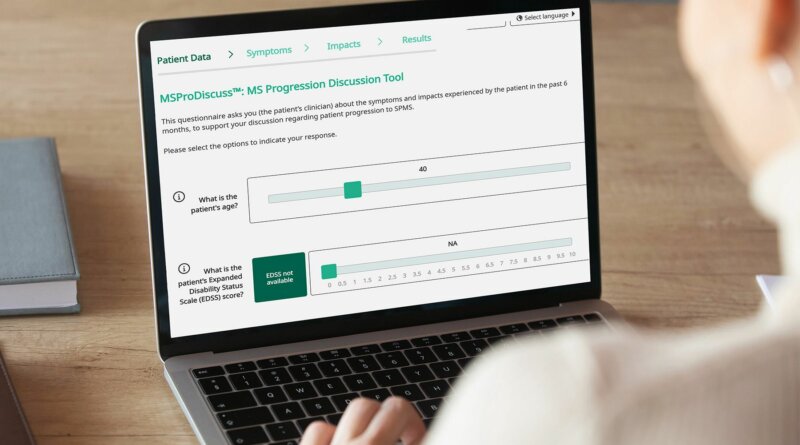MS Questionnaire Helps Measure Symptoms and Spot Early Disease Changes
By Tjalf Ziemssen, MD, as told to Keri Wiginton
Ziemssen presented “Development and Usability Testing of a Patient-based Digital Tool to Understand Early Signs of Changes in Multiple Sclerosis Symptoms and Progression: Your MS Questionnaire” at the American Academy of Neurology’s 73rd Annual meeting, April 17-22, 2021, where scientists discuss the latest research in MS and other brain and nerve conditions.
I think it’s obvious to use digital tools or quantitative scores for certain things, such as a neurological exam. But up to now, there wasn’t a standard way to gather a patient’s history. With the MSProgression Discussion Tool (MSProDiscuss), we can measure someone’s neurological history in a structured way.
MSProDiscuss is a digital tool for health care professionals. They can use it to assess, track, or spot early changes in the course of multiple sclerosis (MS). But doctors don’t always get the full picture. We thought it would be helpful to involve the person with MS as well. That’s why we tried to make sure the “Your MS Questionnaire” was user-friendly.
We know that people with MS are happy to give us input, and they want to get more involved in their treatment. They can fill out the questionnaire at home or before they go into their doctor’s office. That gives their neurologist something in hand to start a conversation with. We found that both doctors and patients like this.
The hope is that a standardized patient history — something a doctor might update every 3-6 months — can give us more clues about the evolution and progression of MS. But it can also boost the “quality time” of an appointment. That’s something I want for my own practice. If I already have screening questions and I know where the problems are, then I can be more precise in how I tackle those issues.
Earlier Symptom Treatment
Most patients think in a different way than their doctors. For them, it’s not all about MRI activity or what happens at the pathological level. They’re driven by symptoms. This questionnaire offers an approach that puts their disease, and the management of that disease, into easy-to-understand categories.
For me, it’s not only important to use this tool to have information about potential disease progression. But if I have answers from a screening questionnaire — for example, about bladder function — I know that I should start symptomatic treatment for the bladder disorder. If we see there’s a problem with pain or spasticity, we can treat that right away.
So the questionnaire gives us information on two fronts: We learn more about the progression or evolution of MS, which could be important for disease-modifying strategies. And we learn things that can be helpful for each person’s symptom treatment.
It also covers all neurological symptoms, even the ones that aren’t so easy or fun to talk about. That can help us help people who might shy away from certain topics. And it gets some of the paperwork out of the way before the visit starts. That gives people more time to talk about important things. When we can do that, I think we’ve managed to have quite a successful visit.
The Your MS Questionnaire
We know that MS affects how the body works in certain ways. These are called functional domains. We ask first about whether there’s disease activity either through an MRI or relapse. Next, we ask about symptoms across different functions of the body. For example, we ask if there are any problems or changes in:
- Eyesight
- Fatigue
- Walking
- Balance or coordination
- Pain
- Unusual sensations or numbness
If someone does have worsening symptoms, they can answer some follow-ups. How often do they have them? Has it been a short time? Do they come and go? Are these issues there all the time? And if someone with MS answered these questions 6 months earlier, we could compare whether their symptoms are the same or different. That can shine some light on whether their MS is getting worse.
We also ask about the impact of symptoms on daily life. That includes activities such as:
- Housework
- Driving
- Hobbies
- Going to work
They can grade the seriousness of the impact from 1-5. That ranges from no impact to you can’t do the activity because your MS symptoms are such a problem.
Get More Details
The questionnaire helps us know if MS symptoms are stable or not. That’s very important whether someone has secondary progressive MS (SPMS) or primary progressive MS (PPMS). If neurologists don’t ask for updates in a systematic way, they might miss a lot of symptoms. For example, people might not understand that their bladder function is linked to MS. They might think urinary problems are something they should tell their urologist about, not their neurologist.
We also believe that a graded symptom history gives us more sensitive information than simply doing a neurological test every 6 months.
What’s Next?
My dream would be that we would have a “checkbot” that people could use. It would be pre-loaded with standard screening questions that could go deeper into symptoms. History is getting more and more important. And if you collect it in a structured way that you can measure it, especially if you compare it to what’s happened within the last 6 months, I think you’ll get even more valuable information.




